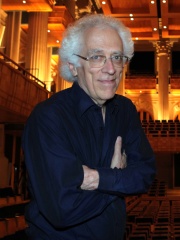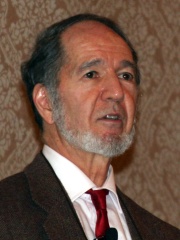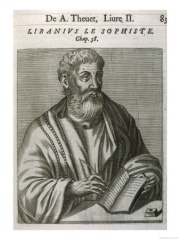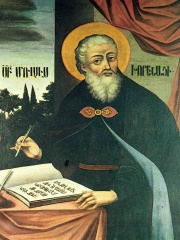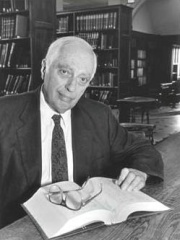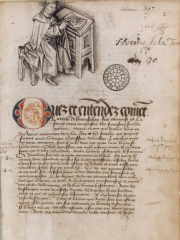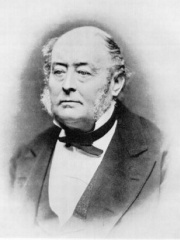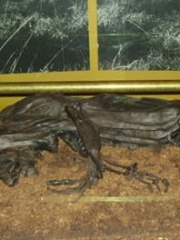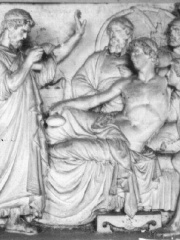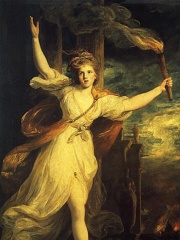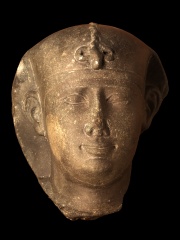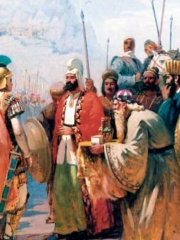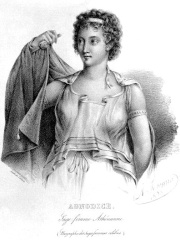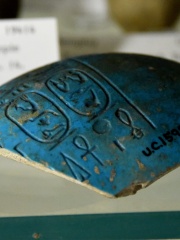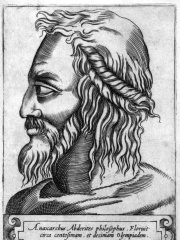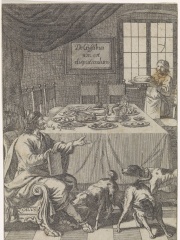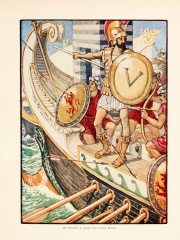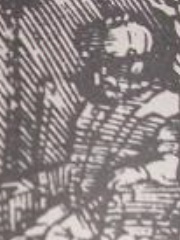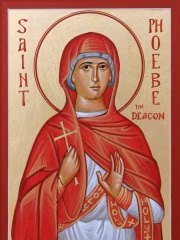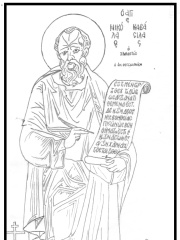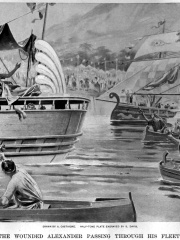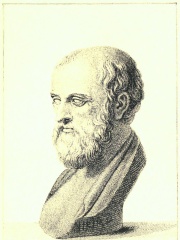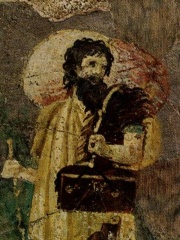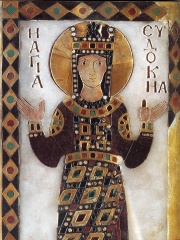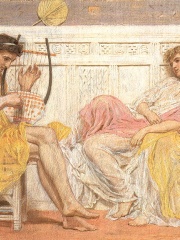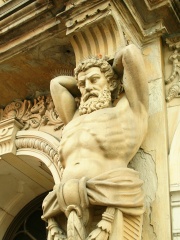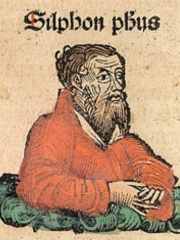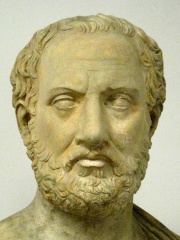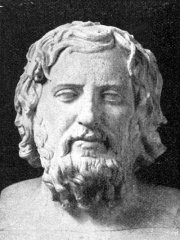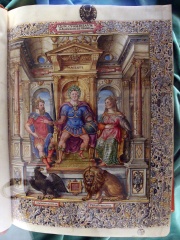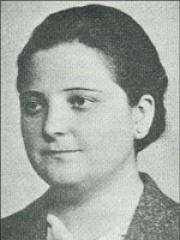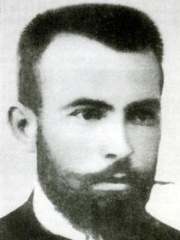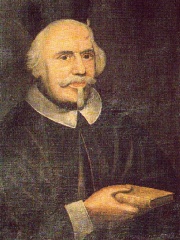Historian
Theopompus
400 BC - 320 BC
EN.WIKIPEDIA PAGE VIEWS (PV)

 Theopompus
Theopompus
Theopompus (Ancient Greek: Θεόπομπος, Theópompos; c. 380 BC – c. 315 BC) was an ancient Greek historian and rhetorician who was a student of Isocrates. Read more on Wikipedia
His biography is available in 36 different languages on Wikipedia. Theopompus is the 69th most popular historian (down from 65th in 2024), the 207th most popular biography from Greece (down from 191st in 2019) and the 6th most popular Greek Historian.
Theopompus was most famous for his writings on the history of Philip II of Macedon.
Memorability Metrics
Page views of Theopompus by language
Among Historians
Among historians, Theopompus ranks 69 out of 561. Before him are Tzvetan Todorov, Jared Diamond, Libanius, Movses Khorenatsi, Callisthenes, and Benzion Netanyahu. After him are Bernard Lewis, Theophylact Simocatta, Geoffrey of Villehardouin, Ephorus, Johann Jakob Bachofen, and Henri Pirenne.
Most Popular Historians in Wikipedia
Go to all RankingsTzvetan Todorov
1939 - 2017
HPI: 70.42
Rank: 63
Jared Diamond
1937 - Present
HPI: 70.39
Rank: 64
Libanius
314 - 393
HPI: 69.87
Rank: 65
Movses Khorenatsi
410 - 490
HPI: 69.73
Rank: 66
Callisthenes
360 BC - 327 BC
HPI: 69.54
Rank: 67
Benzion Netanyahu
1910 - 2012
HPI: 69.50
Rank: 68
Theopompus
400 BC - 320 BC
HPI: 69.44
Rank: 69
Bernard Lewis
1916 - 2018
HPI: 69.41
Rank: 70
Theophylact Simocatta
580 - 630
HPI: 69.32
Rank: 71
Geoffrey of Villehardouin
1150 - 1210
HPI: 69.24
Rank: 72
Ephorus
400 BC - 330 BC
HPI: 69.19
Rank: 73
Johann Jakob Bachofen
1815 - 1887
HPI: 69.01
Rank: 74
Henri Pirenne
1862 - 1935
HPI: 68.87
Rank: 75
Contemporaries
Among people born in 400 BC, Theopompus ranks 9. Before him are Tollund Man, Parmenion, Stateira I, Thaïs, Berossus, and Nectanebo II. After him are Atropates, Ephorus, Leochares, Spitamenes, Agnodice, and Teos of Egypt. Among people deceased in 320 BC, Theopompus ranks 1. After him are Anaxarchus, Zoilus, Anaximenes of Lampsacus, and Dinostratus.
Others Born in 400 BC
Go to all RankingsTollund Man
CELEBRITY
400 BC - 384 BC
HPI: 72.13
Rank: 3
Parmenion
MILITARY PERSONNEL
400 BC - 329 BC
HPI: 71.79
Rank: 4
Stateira I
COMPANION
400 BC - 331 BC
HPI: 70.44
Rank: 5
Thaïs
POLITICIAN
400 BC - 400 BC
HPI: 70.25
Rank: 6
Berossus
WRITER
400 BC - 300 BC
HPI: 70.12
Rank: 7
Nectanebo II
POLITICIAN
400 BC - 343 BC
HPI: 70.02
Rank: 8
Theopompus
HISTORIAN
400 BC - 320 BC
HPI: 69.44
Rank: 9
Atropates
POLITICIAN
400 BC - 360 BC
HPI: 69.37
Rank: 10
Ephorus
HISTORIAN
400 BC - 330 BC
HPI: 69.19
Rank: 11
Leochares
SCULPTOR
400 BC - 400 BC
HPI: 68.77
Rank: 12
Spitamenes
POLITICIAN
400 BC - 328 BC
HPI: 68.73
Rank: 13
Agnodice
PHYSICIAN
400 BC - 360 BC
HPI: 68.41
Rank: 14
Teos of Egypt
POLITICIAN
400 BC - 400 BC
HPI: 67.41
Rank: 15
Others Deceased in 320 BC
Go to all RankingsTheopompus
HISTORIAN
400 BC - 320 BC
HPI: 69.44
Rank: 1
Anaxarchus
PHILOSOPHER
380 BC - 320 BC
HPI: 65.78
Rank: 2
Zoilus
PHILOSOPHER
400 BC - 320 BC
HPI: 64.73
Rank: 3
Anaximenes of Lampsacus
POLITICIAN
380 BC - 320 BC
HPI: 63.34
Rank: 4
Dinostratus
MATHEMATICIAN
390 BC - 320 BC
HPI: 58.29
Rank: 5
In Greece
Among people born in Greece, Theopompus ranks 207 out of NaN. Before him are Brasidas (-500), Callisthenes (-360), Gazi Husrev-beg (1480), Phoebe (50), Nicholas Kabasilas (1322), and Nearchus (-356). After him are Nicias (-500), Crates of Thebes (-365), Aelia Eudocia (401), Bacchylides (-490), Telamon (null), and Stilpo (-359).
Others born in Greece
Go to all RankingsBrasidas
POLITICIAN
500 BC - 422 BC
HPI: 69.63
Rank: 201
Callisthenes
HISTORIAN
360 BC - 327 BC
HPI: 69.54
Rank: 202
Gazi Husrev-beg
POLITICIAN
1480 - 1541
HPI: 69.49
Rank: 203
Phoebe
RELIGIOUS FIGURE
50 - 100
HPI: 69.48
Rank: 204
Nicholas Kabasilas
RELIGIOUS FIGURE
1322 - 1391
HPI: 69.48
Rank: 205
Nearchus
MILITARY PERSONNEL
356 BC - 300 BC
HPI: 69.47
Rank: 206
Theopompus
HISTORIAN
400 BC - 320 BC
HPI: 69.44
Rank: 207
Nicias
POLITICIAN
500 BC - 413 BC
HPI: 69.38
Rank: 208
Crates of Thebes
PHILOSOPHER
365 BC - 285 BC
HPI: 69.38
Rank: 209
Aelia Eudocia
WRITER
401 - 460
HPI: 69.36
Rank: 210
Bacchylides
WRITER
490 BC - 451 BC
HPI: 69.29
Rank: 211
Telamon
POLITICIAN
HPI: 69.16
Rank: 212
Stilpo
PHILOSOPHER
359 BC - 279 BC
HPI: 69.16
Rank: 213
Among Historians In Greece
Among historians born in Greece, Theopompus ranks 6. Before him are Thucydides (-460), Xenophon (-430), Polybius (-208), Quintus Curtius Rufus (41), and Callisthenes (-360). After him are Michael Glykas (1125), Afet İnan (1908), Krste Misirkov (1874), Philochorus (-340), Marsyas of Pella (-400), and Leo Allatius (1586).
Thucydides
460 BC - 397 BC
HPI: 83.71
Rank: 1
Xenophon
430 BC - 354 BC
HPI: 82.05
Rank: 2
Polybius
208 BC - 126 BC
HPI: 77.83
Rank: 3
Quintus Curtius Rufus
41 - 53
HPI: 72.96
Rank: 4
Callisthenes
360 BC - 327 BC
HPI: 69.54
Rank: 5
Theopompus
400 BC - 320 BC
HPI: 69.44
Rank: 6
Michael Glykas
1125 - 1204
HPI: 64.91
Rank: 7
Afet İnan
1908 - 1985
HPI: 62.44
Rank: 8
Krste Misirkov
1874 - 1926
HPI: 61.77
Rank: 9
Philochorus
340 BC - 260 BC
HPI: 60.65
Rank: 10
Marsyas of Pella
400 BC - 360 BC
HPI: 58.87
Rank: 11
Leo Allatius
1586 - 1669
HPI: 57.12
Rank: 12
